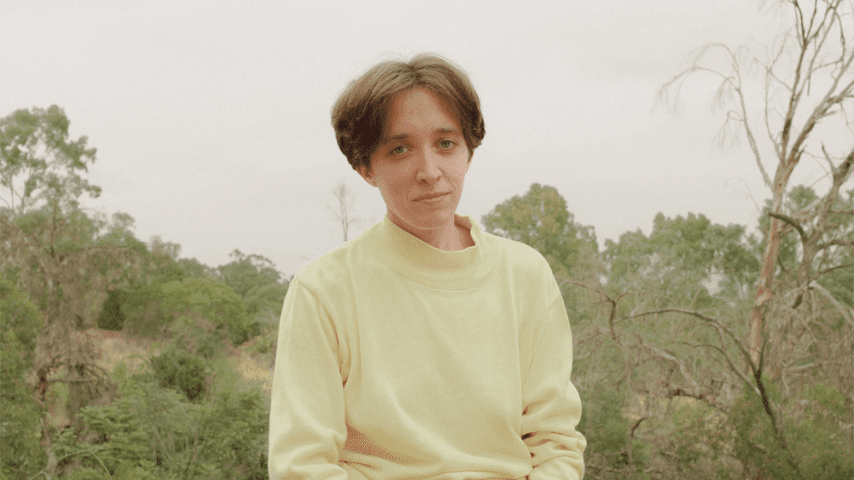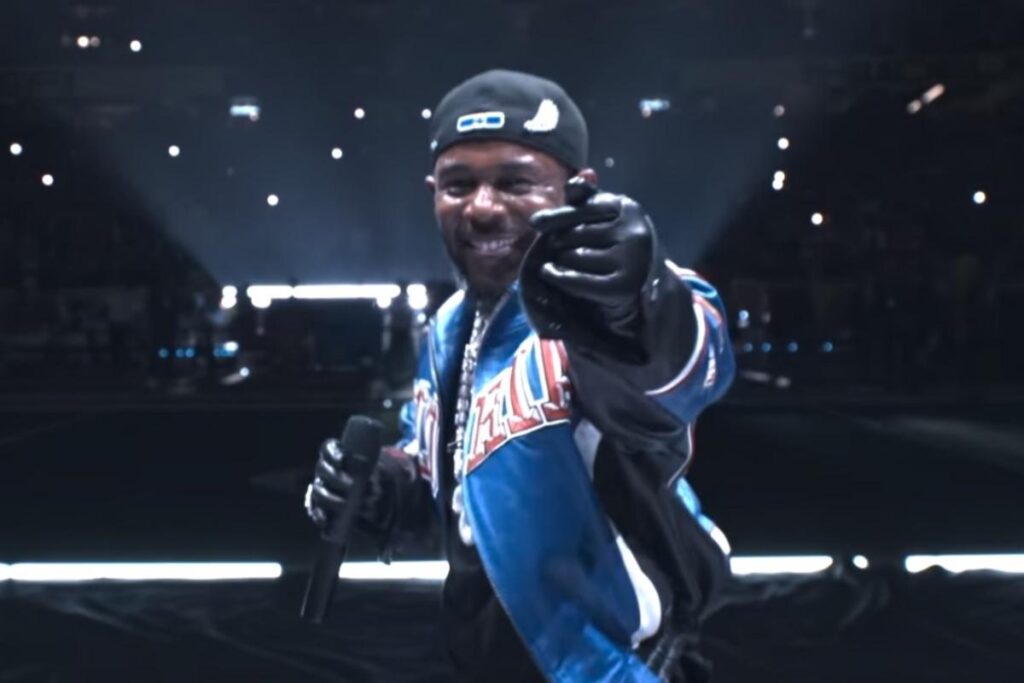At the end of a surreal, scattershot 2020, Mandy Moore is searching for the perfect word to summarize how she’s feeling. And she thinks she’s finally settled on one: Conflicted. Divorced from her mercurial husband Ryan Adams in 2016, she met—then in 2018 married—Dawes anchor Taylor Goldsmith, with whom she co-wrote her current comeback album, Silver Landings, her first recordings in 11 years. Her parallel acting career—once prominent in classic early-oughts flicks like “A Walk to Remember”—also revved back to life, via challenging film and TV roles like 47 Meters Down and This is Us, respectively, and now she and her hubby are expecting their first child, a son, this February. But how can one celebrate such jubilant triumphs during such a soul-crushing, lockdown-quarantined Plague Year? “So 2020 has contained a multitude of conflicts, for sure,” she sighs.
“And obviously, starting a family was a huge bright spot for us, and something that we’re really trying to focus on,” continues Moore, 36. “And obviously, we’re elated about the election and being able to start the new year off on that foot, as well—after feeling this low-grade stress for four years, it feels like we can finally just exhale.”
There’s a lot more to look forward to, she believes, like an upcoming COVID-19 vaccine (Britain’s just got the official green light this week, in fact) and worldwide concert venues reopening, since tours for both herself and Dawes were hastily canceled in the coronavirus wake. “And I’m sitting here in Southern California, with the most beautiful blue skies and gorgeous weather during this really dark time,” she says. “But I get it—there is a lot that we all have to contend with over the next few months, even though there is definitely a light at the end of the tunnel.”
So Moore—with Goldsmith’s songwriting assistance—wanted to share a spark of Yuletide spirit with her festive new original single for Verve/Forecast, the jazzy perambulator “How Could This Be Christmas,” backed with a sleek rendition of Andy Williams’s heartwarming traditional “It’s the Most Wonderful Time of the Year.” And even in “How Could,”, there’s conflict—its full chorus of “How could this be Christmas without you” implies either a permanent, perhaps virus-related absence around the dinner table, or a less-grave, socially distance-warranted one, and the listener is free to read into the plush ballad anything they wish, proving how far Moore as progressed as a composer since her 1999 So Real debut.
“It isn’t melancholy, necessarily,” she appraises, reassuringly. “But it touches on this very specific season that we’re all going to be having while focusing on what’s most important, which is collectivity and togetherness. So it’s still going to be Christmas, but it’s just going to exist in a completely different sense this year.”
Paste: One of the first artists I spoke to after the pandemic hit was Steve Earle. And after I wondered what cinematic future we’d be facing—12 Monkeys or Road Warrior meets Red Dawn— he drily drawled, “Naw, it’s gonna be more like Blade Runner’—a civilization just too gray and dismal to live in.” But now it feels more like Divine Intervention, a broom sweeping aside any power or political personage that doesn’t see climate change as humanity’s #1 priority.
Mandy Moore: For sure. So the world, the environment can cleanse itself. And I started realizing that very early on in the pandemic, like, “Oh—this is the silver lining. This is a terrible thing that we’re going through, but what it will bring about in the end is a collective sense that we got through this together and this overwhelming change, politically.” We’ve kind of been given no choice but to sit up and pay attention. And I am choosing to side on that team.
Paste: I actually remember thinking, a few years back, “Hey—whatever happened to Mandy Moore?” Did you find yourself wondering that, too?
Moore: To a certain extent, for sure. I’ve written about it, and I’ve talked about it to a certain extent. But yeah, absolutely. But I think it’s natural for anyone’s career to have that ebb and flow, and mine certainly has. And the fact that I’m able to sit here, talking to you, 21 years after I started is really the icing on the cake—I can’t believe that I still have some semblance of a career and I’m doing what I love and finding myself in this second chapter.
Paste: And you literally fought off sharks!
Moore: Yeah! I fought off sharks in a cage at the bottom of the ocean! What more do I have to prove?
Paste: How did you find yourself again? And Taylor? And did that coincide?
Moore: It’s interesting. How do I put this? I feel like my personal life a while ago coincided with this idea that I wanted to take a very purposeful, intentional step back, because I had been working since I was 15, for most of my adult life, I guess, at that point, and all of my teenage life. I had really been living kind of a public existence doing what I love, and I was super-grateful. But then I found myself settling down for the first time, in a real way, and wanting to live that life and make that purposeful and intentional. And yeah, it kind of coincided with taking that step away from more public life. And it took me a good eight or nine years to do the work of finding myself, and that coincided with meeting Taylor, getting cast on This is Us— all of that sort of coalesced right around the same time. And they all helped me reach this next chapter. They all sort of go hand in hand in my book, in my thinking. But that’s the hope—to have that sort of evolution. I wouldn’t want to remain stagnant and stay in the same place, whether it’s musically or in any other side of my career. But I definitely found myself at that point in 2007, 2008, going, “Okay, this is wonderful, and I love the opportunity to do this romantic comedy, and I’ll watch those kinds of films ’til the cows come home, but as an actor—as an artist—I want to dig in and find something that’s a bit more challenging, something I’ve never done before, something that people wouldn’t expect from me.” And those opportunities were not presenting themselves, as much as I would go after them. And sure, we’re all sort of seen within a certain context, and I think it was really difficult for people too see me as anything other than the teenager that they had sort of grown up with over the past decade.
Paste: Did you get management in the process?
Moore: I did, but I don’t think that was necessarily the key for me. I think it was taking time away from the way that I had been present up until that point. But it really was also just that one person giving me that one shot, and in my case it was Dan Fogelman going, “Oh, yeah—I think you could play the matriarch of this family on this ensemble drama, and do this character where it’s going to span the entire arc of her life, from her twenties to her mid-eighties.Yeah! I think you can pull that off!” Which really was what changed the course of my life as an artist, just that one person going, “I know she has that in her.” Because that’s all I’d wanted, and that’s all it took for things to creatively turn around for me.
Paste: It must be nice to be encouraged—and aided—in your songwriting by Taylor, too, right?
Moore: Absolutely. There is no one like Taylor. I’m incredibly lucky to have him in my orbit in any capacity. But it’s funny—we don’t really talk about the work side of it so much. I think in my past relationship, there were a lot of songs written over the course of seven years together, and nothing ever saw the light of day for a variety of reasons, none of which make any sense until now. But I also think it was all for a reason. Because there’s such a staggering difference to being with a partner who has your back unconditionally, and it was never a question of whether or not Taylor and I would work together — it just happened. There never really was much of a conversation around it. I know I had my own work to do. I think I had for years tortured myself about who I was as a musician and what I brought to the table, and was that chapter of my life over and did I still want to do it, did I have anything to say? And once I sort of did the work myself in that regard, it was so seamless to just watch the music come to fruition with Taylor and Mike (Viola, ex-Candy Butchers), who’s one of our best friends. So yeah, it is a stark reality that I’ve lived for thirteen years of my life. But being with a partner now
Where it’s like, “Hey, babe — do you wanna go do an Instagram live?” “Okay! We’ll sing some of your songs, we’ll sing some of my songs.” It’s just not a thing — there’s no competition between us, there’s no intention of dimming anyone’s lights to make somebody else feel better. There is such equality in what we do and what we share, and I feel so lucky. It is so endlessly inspiring to be around somebody like Taylor — I have never known a musician to practice and play as much as he does. He’s constantly writing, and when he’s not writing, he’s reading to fuel the writing, or he’s watching movies to fuel the writing. His existence is around being a songwriter, and that can’t help but rub off on you when you’re living under the same roof with somebody for five years. So I just feel so lucky that I have that influence now, with everything we write and what we get to do together.
Paste: And you’ve grown into such a mastery of the craft that the most chiming, chipper song on “Silver Landings” is lyrically the darkest — “Easy Target.”
Moore: Oh, yeah! That was kind of the intention. And I’m really proud of that record — I’m so glad we did it, and now I have something for us to build upon. We’re already writing the next record, and hopefully we’ll record that at some point next year, and then when the world opens back up again, we’ll be able to go on the road and play all of this new music. That’s the real hope.
Paste: Thematically, the album seems to be your credo in lyrics.
Moore: Yeah, it is. Definitely “Save a Little For Yourself,” and definitely “Forgiveness,” as well. There are things that I’ve had to constantly remind myself of over the last decade of my life, and probably some things I’ll have to continue to remind myself of. I’m learning, I’m learning. And I think I’m getting a lot better.
Paste: Are you still a cat lover?
Moore: We have three cats. Yes, we are cat lovers — there’s Sig, Olivia and Peanut, and then we have Joanie and Jackson are our dogs. They’re just rescue mutts, a shepherd and a terrier, but they’re old, an old girl and an old dude. So we have a nice full house — there’s lots going on here. And I do think the cats are very happy when we have to run errands or leave the house, because they can have the run of the house again, because we’ve all been spending so much time together this past nine months. It’s gonna be weird to leave. I don’t know if you’ve experienced this, but even just running errands and doing just a few things, I find myself so much more exhausted. Not stressed out. But I would have really crazy full days and be able to handle everything before and not think anything of it. But now just going to the grocery store or doing certain things, I’m like, “Whew! This has been a REALLY taxing day!” So now I’m like, “Oh, God! We’re all gonna be in for it when the world opens back up again! We’re gonna have to pace ourselves, build ourselves back up to the speed at which we were living our life before.”
Paste: What do the new songs that you guys have been writing, post-pandemic? Are they dark or conversely light?
Moore: I think there’s a good mix of both. I think I’m always gonna be a glass-is-half-full kinda gal. But these songs are a variation on “Silver Landings,” but they’re sort of the next step. I was very intent on not letting too much time lapse between records. Even if we were able to go on the road, and the world hadn’t shut down the way that it has, I was saying, “While we’re on the road we need to keep writing and figuring out when we’re going to make the next record.” I really didn’t want to lose the momentum. I was like, “Okay — it’s been over 11 years since I’ve made music, it’s been 14 since I’ve been on the road. I just don’t want to turn the machine off again. Things are up and running, so let’s figure out a way to keep it going.” And obviously, living under the same roof as Taylor, it’s very easy for us to make time to sit down and write together. And now we have Mike Coe over and we sit outside and socially distance and write, and it’s been great. You’ve gotta connect with people still, and it’s nice to have something to work towards, even though I have such a weird schedule because of work, because “This is Us” has started shooting again.
Paste: I would be remiss, however, if I didn’t mention one of your most crowning achievements—you got to voice the character of Courtney, Quagmire’s daughter on Family Guy, and even got to say his catchphrase “Giggity”!
Moore: Yeah! I know one of the Family Guy writers really well—we worked on a pilot together years ago, and he just emailed me one day, asking, “Would you wanna be on the show?” And I was like, “Yes! Absolutely! Of course!” It was pretty easy in that sense. I did The Simpsons, too, but probably 10 years ago. It was a long time ago—I played a pop star, and I don’t remember her name. And that was fun, too. It’s been crazy, just checking those bucket-list things off!




